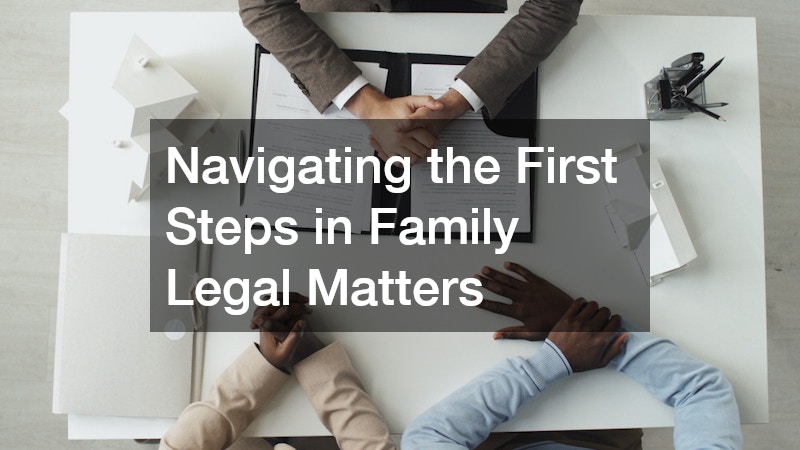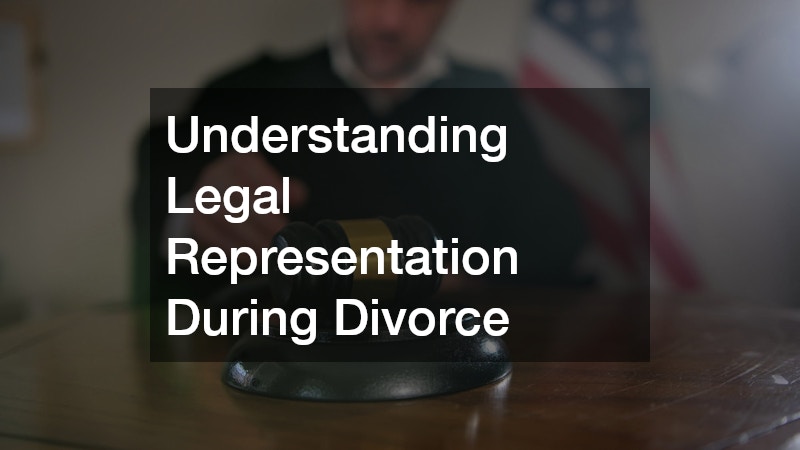When families face legal issues, the situation can feel overwhelming and emotionally draining. From disputes over parenting time to the complexities of property division, these matters often affect some of the most personal aspects of people’s lives. Unlike other areas of law that may be more transactional, cases involving family matters strike at the heart of relationships, responsibilities, and long-term well-being. Navigating the legal system in these situations requires not only knowledge of the law but also an understanding of the emotional realities that families are facing.
These matters often require guidance from professionals who can balance compassion with expertise. They are rarely just about paperwork or procedures; they involve deeply held emotions, ongoing relationships, and the need for workable solutions that support both adults and children. Having someone explain the process, answer difficult questions, and outline potential outcomes can make a significant difference in reducing stress and creating a sense of control.
Family-related legal matters also tend to evolve. A separation may begin as a conversation about finances but can quickly expand to questions about custody, parenting schedules, or even protection from harm. What starts as a single concern may grow into multiple areas that require attention, making it essential to work with professionals who understand the interconnected nature of these cases.
The legal process itself can also be confusing for anyone who has never experienced it. Court systems use unfamiliar language, involve strict deadlines, and require extensive documentation. Without guidance, individuals may feel lost or make mistakes that affect the outcome. Professional support ensures that people know what steps to take, how to prepare, and what to expect as their case progresses.
Because the outcomes of these cases are so significant, it is crucial to take the time to understand available options and make informed choices. Custody arrangements, financial agreements, and protective measures all have lasting effects that can shape family life for years. The right approach can protect relationships, safeguard well-being, and create a more stable future.
Navigating the First Steps in Family Legal Matters

For many people, the first encounter with a legal issue involving family matters begins with uncertainty and stress. Whether someone is thinking about separation, struggling with communication, or facing difficult financial circumstances, the earliest stages are often the most confusing. This is when professional guidance becomes essential. Seeking out divorce advice at the outset provides clarity about rights, responsibilities, and available options.
Getting reliable information early helps people avoid common mistakes that could complicate the situation later. Advice can cover everything from understanding how assets might be divided to what steps need to be taken if children are involved. The initial guidance lays the groundwork for making thoughtful decisions rather than reacting out of fear or frustration. Many people also find that hearing an objective perspective helps them step back from the emotional intensity of the moment.
At this stage, the value of working with a trusted family law practice becomes clear. Professionals in this field are trained to listen carefully, ask the right questions, and provide clear direction. They can help identify what immediate actions are necessary and what can wait until further along in the process. By creating a plan, they reduce uncertainty and help clients focus on what matters most.
Protecting Families Through Court-Ordered Measures
In some cases, family legal issues go beyond disagreements about property or parenting schedules. When safety becomes a concern, stronger measures are needed. Restraining orders are one of the most important legal tools available to protect individuals and families from harm. They provide court-ordered boundaries that restrict contact and can include specific rules about communication, proximity, and behavior.
Filing for this type of protection can be daunting, but it is often essential. The process typically requires detailed documentation and, in many cases, a court appearance. Having professional support during this time ensures that the request is properly prepared and that all necessary evidence is included. The stakes are high, as these orders can directly impact safety and peace of mind.
Family law plays an important role in guiding people through this process. Lawyers familiar with protective measures understand both the legal standards and the emotional difficulty involved. They can provide reassurance while also making sure that the legal requirements are met. By securing protective measures, families gain an immediate sense of safety while longer-term solutions are pursued.
Guidance for Parents Facing Custody Challenges
Few issues in family law are as sensitive and emotionally charged as matters involving children. Determining who a child will live with, how time will be divided, and what role each parent will play in decision-making are all deeply personal concerns. Working with a custody attorney provides parents with the legal knowledge and advocacy they need to navigate this process.
Custody decisions are based on the best interests of the child, but understanding how that standard is applied can be complex. Courts consider a wide range of factors, from each parent’s ability to provide a stable environment to the child’s own needs and preferences. A professional can explain how these factors are likely to influence the outcome and help parents prepare accordingly.
By turning to a family law practice that specializes in custody issues, parents gain access to professionals who understand both the law and the emotional realities of parenting disputes. They can help negotiate parenting plans, represent clients in hearings, and work toward solutions that prioritize the well-being of the child.
Understanding Legal Representation During Divorce

When a marriage ends, the legal process of divorce can feel overwhelming. There are questions about property division, financial responsibilities, and ongoing obligations. Having a divorce lawyer ensures that a person’s rights are protected and that the process is handled in a fair and organized manner.
Representation is especially important when emotions run high. A lawyer can help clients understand what is realistic, what is required by law, and what strategies are available for negotiation. This reduces conflict and helps avoid unnecessary delays. Without professional support, individuals risk overlooking important details or agreeing to terms that are not in their best interest.
A family law practice provides comprehensive services during divorce proceedings. From filing paperwork to representing clients in court, professionals ensure that each step is properly managed. Their role is to safeguard their client’s interests while also working toward practical solutions that allow both parties to move forward.
Exploring Specialized Practices for Complex Cases
Not every case is straightforward. Some divorces involve complex financial holdings, business ownership, or disputes that cannot be easily resolved. In these situations, divorce law firms that focus on specialized or high-conflict cases can be invaluable. They bring together teams of professionals with experience in handling complicated matters that require careful analysis and strategy.
These firms often have resources that smaller practices may not, such as access to financial experts or dedicated teams for research and preparation. Their ability to manage complex cases ensures that nothing is overlooked. Clients benefit from the combined expertise of multiple professionals working together on their behalf.
By engaging a family law practice that can handle specialized issues, individuals gain confidence that their case will be managed with skill and attention to detail. This is particularly important when financial stability, business ownership, or significant assets are at stake.
Choosing the Right Practice for Your Situation
Finding the right legal support is one of the most important steps in any family-related legal matter. Not all firms are the same, and choosing a family law firm that matches the needs of the case makes a significant difference.
When evaluating options, people should consider the firm’s experience, reputation, and approach. Some firms are more focused on negotiation and mediation, while others have a strong record of courtroom advocacy. Understanding what is most important in a particular case helps in making the best choice.
Selecting the right family law practice ensures that clients receive support tailored to their situation. It also creates a sense of trust and confidence, which is essential during such a challenging time.
Finding Common Ground Outside the Courtroom

Not all family disputes need to end up in lengthy court battles. In fact, many families benefit from exploring alternatives to litigation. Divorce mediation offers a path for couples to work together with a neutral professional to reach agreements on important issues.
Mediation provides a more collaborative and less adversarial environment. It allows both parties to have input and encourages problem-solving rather than confrontation. This can be especially helpful when children are involved, as it reduces conflict and promotes healthier co-parenting relationships.
A family law practice that offers mediation services helps clients resolve disputes more efficiently and with less emotional strain. By focusing on collaboration, mediation creates solutions that are more sustainable and respectful of both parties.
The Importance of Professional Representation
Whether the issue is custody, financial support, or protection, having professional representation makes all the difference. An attorney serves not only as an advocate but also as a guide through the complexities of the legal process. They ensure that clients understand their rights, meet their obligations, and are prepared for each step.
Representation provides reassurance during uncertain times. It means that someone knowledgeable is handling the details, allowing clients to focus on their families and personal well-being. This professional support helps reduce stress and avoid mistakes that could negatively affect the outcome.
Working with a family law practice ensures that clients have access to dedicated attorneys who are committed to achieving the best possible results. Their expertise and guidance give individuals the confidence to move forward with their case.
Recognizing the Range of Legal Professionals Available
The legal field is broad, and many different professionals can provide valuable support. Lawyers in family law handle a wide range of matters, from drafting agreements to representing clients in court. Their ability to adapt to different situations makes them essential partners during times of change.
Lawyers also provide perspective. They can explain how the law applies to specific circumstances, outline potential outcomes, and recommend strategies for moving forward. Having this insight helps people make informed decisions rather than relying on assumptions or incomplete information.
A family law practice brings together lawyers with diverse skills and backgrounds. This variety ensures that clients receive comprehensive support, whether their case involves straightforward agreements or complex litigation.
Accessing Legal Support Close to Home

For many people, finding local lawyers is an important part of addressing family legal issues. Working with professionals in the same community means easier access to meetings, greater familiarity with local courts, and a better understanding of community resources.
Local representation also builds trust. Clients often feel more comfortable working with someone who understands their area, its culture, and the people who live there. This connection can make the process less intimidating and more supportive.
By choosing a family law practice with strong local ties, individuals benefit from both legal expertise and community knowledge. This combination creates a supportive environment that helps families navigate difficult times more effectively.
Family legal matters are among the most personal and impactful issues that people face. From the earliest stages of uncertainty to the resolution of complex disputes, each step brings unique challenges and lasting consequences. The importance of having trusted guidance throughout this journey cannot be overstated. Without support, individuals risk confusion, unnecessary conflict, and outcomes that may not serve them or their families well in the long term.
Working with dedicated professionals ensures that people are not navigating these challenges alone. Whether the concern involves children, property, or safety, having someone knowledgeable to explain the law, represent interests, and suggest solutions provides invaluable reassurance. It allows clients to move through the process with greater confidence and less fear of the unknown.
Equally important is the ability to find approaches that balance legal requirements with emotional needs. Families do not just need legal solutions; they need practical, compassionate support that recognizes the complexity of human relationships. The right professionals bring this balance, offering not just advocacy but also understanding and respect.
Another critical factor is the long-term impact of decisions made during these processes. Custody arrangements, financial agreements, and protective measures can shape the lives of both adults and children for years to come. Taking the time to work with a skilled family law practice ensures that these outcomes are carefully considered and thoughtfully implemented.
A family law practice offers more than just legal knowledge. It provides a framework for resolving disputes, protecting rights, and promoting stability. By combining expertise with compassion, these practices help families move forward in ways that support healing and growth. They create opportunities for collaboration where possible and strong advocacy when necessary.

